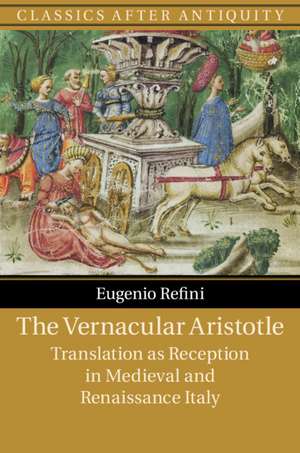The Vernacular Aristotle: Translation as Reception in Medieval and Renaissance Italy: Classics after Antiquity
Autor Eugenio Refinien Limba Engleză Paperback – 5 apr 2023
| Toate formatele și edițiile | Preț | Express |
|---|---|---|
| Paperback (1) | 223.85 lei 6-8 săpt. | |
| Cambridge University Press – 5 apr 2023 | 223.85 lei 6-8 săpt. | |
| Hardback (1) | 696.80 lei 6-8 săpt. | |
| Cambridge University Press – 26 feb 2020 | 696.80 lei 6-8 săpt. |
Din seria Classics after Antiquity
-
 Preț: 281.67 lei
Preț: 281.67 lei -
 Preț: 214.49 lei
Preț: 214.49 lei -
 Preț: 177.01 lei
Preț: 177.01 lei -
 Preț: 234.26 lei
Preț: 234.26 lei -
 Preț: 216.36 lei
Preț: 216.36 lei - 9%
 Preț: 593.31 lei
Preț: 593.31 lei -
 Preț: 177.16 lei
Preț: 177.16 lei -
 Preț: 176.39 lei
Preț: 176.39 lei -
 Preț: 201.98 lei
Preț: 201.98 lei -
 Preț: 282.65 lei
Preț: 282.65 lei -
 Preț: 282.87 lei
Preț: 282.87 lei -
 Preț: 177.86 lei
Preț: 177.86 lei
Preț: 223.85 lei
Nou
Puncte Express: 336
Preț estimativ în valută:
42.83€ • 44.84$ • 35.44£
42.83€ • 44.84$ • 35.44£
Carte tipărită la comandă
Livrare economică 07-21 aprilie
Preluare comenzi: 021 569.72.76
Specificații
ISBN-13: 9781108741439
ISBN-10: 1108741436
Pagini: 296
Ilustrații: 19 b/w illus.
Dimensiuni: 152 x 229 x 16 mm
Greutate: 0.4 kg
Editura: Cambridge University Press
Colecția Cambridge University Press
Seria Classics after Antiquity
Locul publicării:Cambridge, United Kingdom
ISBN-10: 1108741436
Pagini: 296
Ilustrații: 19 b/w illus.
Dimensiuni: 152 x 229 x 16 mm
Greutate: 0.4 kg
Editura: Cambridge University Press
Colecția Cambridge University Press
Seria Classics after Antiquity
Locul publicării:Cambridge, United Kingdom
Cuprins
Introduction: translation as reception; 1. Taming the philosopher; 2. The master of those who know (and those who don't); 3. Family business: readying the ethics for the layman; 4. The philosopher, the humanist, the translator and the reader; 5. Abridging the philosopher(s); Conclusion: the spirit in the crystal bottle.
Recenzii
'This book provides an excellent case-study both for the dividends reaped from paying close attention to how the classics were read in the later medieval period and how failure to pay attention to this material risks distorting our understanding of the Renaissance.' Justin Stover, Bryn Mawr Classical Review
'Scholars of the Renaissance and medieval period, of the history of philosophy, and of the history of the book and of literacy will prize Refini's immensely learned volume. It is equally valuable to literary scholars focused on the practice of reception and on translation, both of which are essential to scholarly interrogation of cultural continuity and discontinuity from the ancient to the modern periods.' Brenda Deen Schildgen, Speculum: A Journal of Medieval Studies
'Scholars of the Renaissance and medieval period, of the history of philosophy, and of the history of the book and of literacy will prize Refini's immensely learned volume. It is equally valuable to literary scholars focused on the practice of reception and on translation, both of which are essential to scholarly interrogation of cultural continuity and discontinuity from the ancient to the modern periods.' Brenda Deen Schildgen, Speculum: A Journal of Medieval Studies
Notă biografică
Descriere
The first study of the reception of Aristotle in Medieval and Renaissance Italy that considers the ethical dimension of translation.
